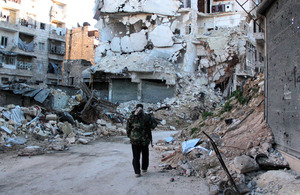Human Rights and Democracy Report 2012 - Syria
More than 100 people on average were dying every day, and recent UN estimates suggest that over 55,000 people were killed in 2012.

Aleppo, Karm al Jabal. This neighborhood is next to Al Bab and has been under siege for 6 months, 4 March 2013. Credit: Basma
Human rights in countries of concern - Syria
Since the beginning of protests against President Assad’s rule across Syria in March 2011, the situation has dramatically worsened. Throughout 2012, the regime continued to use violence against the Syrian people and widespread clashes between opposition fighters and the military persisted. More than 100 people on average were dying every day, and recent UN estimates suggest that over 55,000 people were killed in 2012.
The Assad regime is responsible for numerous human rights violations including unlawful killings, arbitrary detention, sexual violence and torture against men, women and children. The international community has called repeatedly upon the regime to put an end to such atrocities. The United Nations International Commission of Inquiry (COI) stated that some anti-government armed groups were also responsible for committing human rights abuses, though these were not on the same scale as those committed by the regime.
In 2012, the UK sought to reduce the level of human rights violations and abuses and ensure accountability for the perpetrators. The UK has been at the forefront of the work of the UN Human Rights Council and has co-sponsored a number of Human Rights Council resolutions on Syria, including the resolution on 1 June which condemned the al-Houleh massacre of 25–26 May.
The UK supported the Arab-led UN General Assembly 3rd Committee resolution on Syria in November, which condemned the regime and its Shabbiha militias’ widespread and systematic human rights violations. The resolution also condemned abuses carried out by some anti-government armed groups.
The UK has worked with the EU to impose sanctions targeting Syrian regime figures responsible for human rights violations. We raised long-standing concerns over human rights with the Syrian government during 2012. Direct communication with the Syrian government became more limited in the course of the year, with the closure of the British Embassy in Damascus in March and the subsequent departure of Syrian diplomats from the Syrian embassy in London in August.
On 20 November, the UK recognised the National Coalition of Syrian Revolutionary and Opposition Forces as the sole legitimate representative of the Syrian people and urged them to commit to the principles set out in relevant human rights conventions and applicable international humanitarian law, including the protection of all religious communities and safe access for humanitarian agencies.
The UK’s goal in Syria through 2012 has been for President Assad to step aside to allow for a transition to a more stable, democratic and law-abiding Syria. The intransigence of the Syrian regime and the persistent divisions in the UN Security Council made this difficult to achieve in 2012.
In 2013, the UK Government will increase its efforts to achieve an end to the violence in Syria and make way for a political transition. It is vital that those who committed human rights violations and abuses before and during the conflict are held accountable in law, though it is for Syrians to determine the precise form of transitional justice in accordance with international standards.
Further information
Read and comment in English on Human rights in countries of concern - Syria
Read and comment on the Human Rights and Democracy Report 2012 in full in English